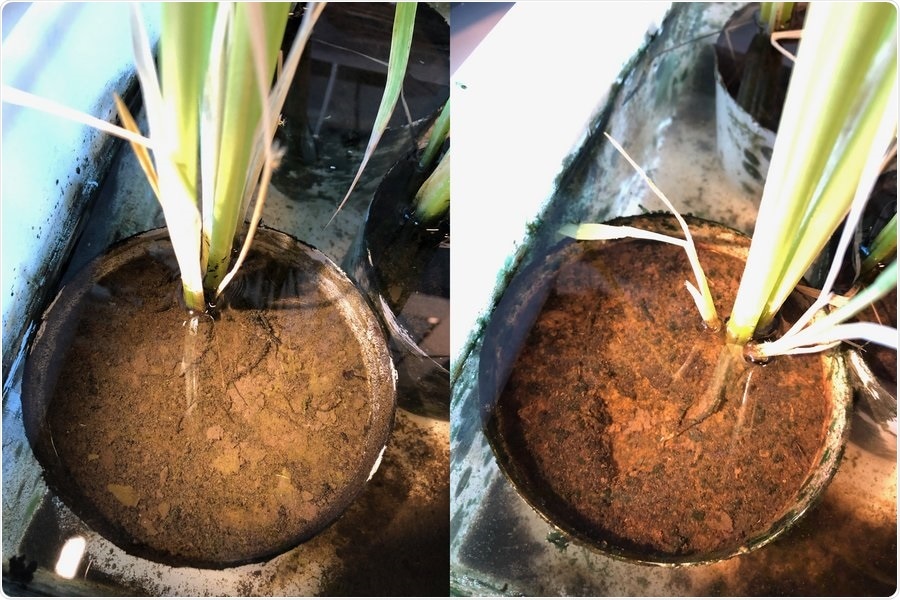A collaboration between German and Danish researchers could have come up with a solution to the huge climate impact caused by global rice production: if electric conductive cable bacteria are added to the soil with rice plants, methane emissions could be reduced by over 90%.

Rice plants in soil without cable bacteria (left) and with cable bacteria (right). The activity of cable bacteria can be clearly seen by the formation of an orange rust crust on the surface of the soil in the rice pot. The bacteria dissolve black iron sulfide in the soil and convert the sulfide into sulfate while the iron wanders to the surface and forms rust when it comes into contact with oxygen. Image Credit: Vincent Valentin Scholz, Aarhus University.
While rice crops sustain 50% of the global population, rice cultivation is known to have an adverse impact on the climate.
In fact, the rice fields are responsible for 5% of global emissions of methane, which is a greenhouse gas and 25 times stronger than the CO2 gas.
The reason is these rice plants typically grow in water. When flooding occurs in the fields, the oxygen content of the soil becomes less, which provides the right conditions for the pathogens to release methane.
The scientists from the University of Duisburg-Essen and Aarhus University have now discovered that electric conductive cable bacteria could be a significant part of the solution. In a laboratory setting, the researchers were able to grow rice in soil, with and without the electric conductive cable bacteria, and assessed the events.
And the difference was far beyond my expectations. The pots with cable bacteria emitted 93% less methane than the pots without cable bacteria.”
Vincent Valentin Scholz, Center for Electro microbiology, Aarhus University
Scholz performed the experiments as a Ph.D. student at Aarhus University’s Center for Electro microbiology. The study result was recently published in Nature Communications, a scientific journal.
Increases sulfates and attenuates microbes
Cable bacteria transport electrons over centimeter distances along their filaments, changing the geochemical conditions of the water-saturated soil. The cable bacteria recycle the soil's sulfur compounds, thus maintaining a large amount of sulfate in the soil. This has the consequence that the methane-producing microbes cannot maintain their activity.”
Vincent Valentin Scholz, Center for Electro microbiology, Aarhus University.
It is well known that rice growers can momentarily reduce the emission of methane gas by distributing sulfate on the rice fields. Evidently, cable bacteria can perform this task for them.
This discovery adds a new dimension to the role of these cable bacteria as ecosystem engineers. Although the study’s authors emphasized that they have only the most initial laboratory observation in their hands, it is nevertheless interesting to speculate that enrichment of these pathogens through practical management of soil and water regime could turn out to be a sustainable and easy solution for decreasing the emissions of methane gas from rice fields.
Undoubtedly, field studies would be required to observe how these cable bacteria can flourish in rice fields.
Source:
Journal reference:
Scholz, V. V., et al. (2020) Cable bacteria reduce methane emissions from rice-vegetated soils. Nature Communications. doi.org/10.1038/s41467-020-15812-w.